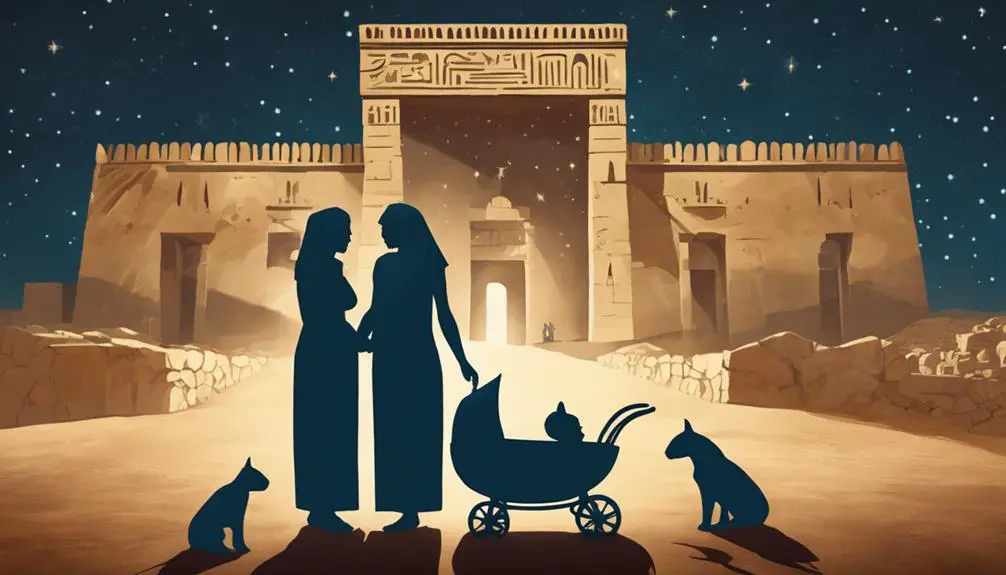Unveil the transformative power of honesty through ancient stories in the Bible, and discover how truth shapes our lives and relationships.

Stories of Honesty in the Bible
Interestingly, over 90% of people claim honesty is a value they prioritize, yet navigating the truth remains a complex theme in our lives.
The Bible, rich in narratives, offers profound insights into honesty through characters like Nathan, Achan, and Zacchaeus. You'll discover that their stories aren't just about the act of being truthful but also about the consequences and transformations that follow.
As you explore these biblical accounts, you'll find yourself reflecting on the true essence of honesty in your own life.
So, why not join the conversation and uncover what these ancient texts can teach us today?
Key Takeaways
- Biblical narratives highlight the power of honesty to confront wrongdoing and foster accountability.
- Honesty can require defiance and courage, especially when facing unjust authority.
- Truth-telling often leads to personal transformation and redemption for individuals.
- Honest actions have significant impacts on community cohesion, healing, and the protection of the innocent.
Nathan Confronts David

In the narrative of Nathan confronting David, we observe a pivotal moment of moral reckoning, where the prophet Nathan skillfully exposes King David's transgressions, prompting an introspective reflection on honesty and accountability. This story is emblematic of confrontation ethics and leadership accountability, illustrating the challenges and necessities of holding the powerful to account. Nathan doesn't directly accuse David but uses a parable to lead David to recognize his own faults, showcasing a nuanced approach to ethical confrontation.
You'll see that Nathan's approach underscores the importance of tact and wisdom in addressing wrongdoing, especially when it involves leaders. By drawing David into the moral of the story, Nathan facilitates a space for David to admit his guilt, demonstrating that effective confrontation can lead to genuine acknowledgment of wrongdoing. This narrative highlights the critical role of honesty within the framework of leadership accountability. It suggests that true leadership isn't exempt from scrutiny and that moral integrity is paramount.
The story serves as a crucial lesson in the complexities of confronting those in power. It emphasizes that holding leaders accountable, while challenging, is essential for justice and ethical governance. Through Nathan's example, you're shown that confrontation, when handled with care and wisdom, can foster an environment of honesty and accountability.
Achan's Confession

Shifting focus to Achan's story, we encounter another profound biblical example of honesty, where his confession of sin highlights the personal responsibility and consequences of one's actions within a communal context. Achan's guilt for taking stolen spoils from Jericho directly contravenes divine command, setting a precedent on the gravity of individual sins affecting the collective well-being of the Israelites.
Aspect |
Impact |
|---|---|
Achan's Confession |
Illuminates the necessity of accountability |
Stolen Spoils |
Demonstrates tangible disobedience |
Communal Consequences |
Highlights the ripple effect of personal sin |
Achan's admission reveals a critical dimension of honesty: it's not solely about the confession but understanding the ramifications of one's misdeeds. His story serves as a stark reminder that dishonesty, particularly when it involves taking what isn't one's own, detrimentally impacts not just the individual but the entire community.
In analyzing Achan's guilt, it's essential to recognize that his actions and subsequent confession underscore a broader biblical theme: honesty is foundational to the integrity and health of a community. Achan's narrative is a powerful lesson in the severe consequences of straying from truthfulness, urging a return to honesty as a pivotal communal and spiritual value.
The Midwives Defy Pharaoh

Amidst the oppressive reign of Pharaoh over the Israelites, the defiance of the midwives showcases a profound act of honesty and courage, fundamentally challenging the edicts of power with integrity. Their decision not to obey Pharaoh's command to kill all newborn Hebrew boys is a stark testament to the ethical dilemmas they faced. This courageous defiance isn't merely an act of rebellion but a deep moral commitment to preserving life, highlighting the complexities of honesty when it intersects with the preservation of human dignity.
The narrative underscores the midwives' strategic wisdom and bravery. By reporting that Hebrew women give birth before they arrive, they navigate the perilous waters of disobedience without directly confronting authority. This subtlety in their defiance illuminates the nuanced ways in which honesty can manifest, especially under tyrannical rule. Their actions underscore a critical lesson: sometimes, true honesty involves resisting unjust orders and protecting the innocent, even at great personal risk.
Moreover, their story serves as a pivotal moment in biblical history, underscoring how individual acts of integrity can have far-reaching consequences. The midwives' ethical stance not only saved lives but also contributed to the eventual deliverance of the Israelites from bondage, showcasing the enduring power of moral courage.
Zacchaeus' Transformation

Exploring the transformation of Zacchaeus in the Bible reveals an evocative narrative of redemption and the profound impact of honesty on personal change. Zacchaeus, a wealthy tax collector despised by his community, embodies the theme of tax collector's redemption through an honest reckoning with his past actions. His story unfolds as he encounters Jesus, leading to a pivotal moment of self-awareness and the decision to rectify his wrongdoings.
This account illustrates not just a personal transformation but also underscores the potential for societal acceptance through genuine repentance and honesty. Zacchaeus pledges to give half of his possessions to the poor and to repay four times the amount if he's cheated anyone. This act of restitution is significant, highlighting the tangible expressions of honesty and the steps toward rectifying past injustices.
Analyzing Zacchaeus' transformation, it's apparent that his honesty catalyzes not only his acceptance back into the community but also represents a broader lesson on the power of transparency and integrity. Through this narrative, the Bible underscores the transformative potential of honesty in achieving personal redemption and fostering societal acceptance.
Peter's Admission

While the story of Zacchaeus underscores the transformative power of honesty in personal redemption, Peter's admission similarly reveals the depth of integrity required for spiritual and communal reconciliation. Peter's denial of Jesus, a moment of profound leadership failure, sets the stage for one of the most poignant tales of graceful restoration in the scriptures. Your understanding of this narrative not only enriches your grasp of honesty's role in healing relationships but also highlights the indispensable nature of transparency in leadership.
- *Integrity in Crisis*: Peter's denial under pressure showcases the complexity of human integrity when faced with fear and uncertainty.
- *Acknowledgment of Failure*: His admission of guilt is a critical step towards restoration, emphasizing the importance of confronting one's shortcomings.
- *Divine Grace*: The narrative illustrates that graceful restoration is often a divine response to honest acknowledgment of personal failings.
- *Community Reconciliation*: Peter's journey from denial to admission underlines the role of honesty in mending broken communal bonds.
- *Leadership Redemption*: The story symbolizes the possibility of redemption and reinstatement, even after significant leadership failures.
Analyzing Peter's admission, you're invited to reflect on the multifaceted relationship between honesty, leadership failure, and graceful restoration, and its relevance in both personal and communal spheres of life.
Frequently Asked Questions
How Do Modern Interpretations of These Biblical Stories Address the Complexities of Honesty in a Digital Age?
You're exploring how modern interpretations address honesty's complexities in our digital era, without leaning on biblical stories. Scholars focus on digital ethics and online transparency, analyzing how these principles apply to current situations.
They delve into the nuances of honesty in digital communications, social media, and data privacy. This exploration is crucial for understanding how ancient values of honesty are reinterpreted and applied in the context of today's digital landscape.
Are There Any Psychological Studies That Explore the Impact of These Biblical Stories on an Individual's Moral Development?
Yes, there are psychological studies focusing on how moral narratives, like those found in religious texts, influence an individual's moral development. These studies often explore neurological correlates and behavioral genetics to understand the impact.
They examine how such stories activate specific brain regions, potentially shaping moral reasoning and behavior. Additionally, research in behavioral genetics may reveal how individuals' responses to these narratives are influenced by genetic predispositions, offering insights into the complex nature of moral development.
How Have Different Cultures Around the World Adopted or Adapted These Stories to Teach Honesty Within Their Own Societal Context?
You've noticed how different cultures adopt or adapt stories to teach honesty, emphasizing cultural translation and societal integration. This process involves meticulously selecting tales that resonate with local values and morals, ensuring they're relevant and impactful.
What Are the Historical Inaccuracies or Anachronisms Found in These Stories When Compared to Archaeological Findings or Historical Records?
You're delving into the accuracy of ancient narratives, specifically focusing on geographic discrepancies and chronological inconsistencies.
It's crucial to note that while these tales may hold moral and ethical lessons, when you scrutinize them against archaeological evidence and historical records, you often find mismatches.
These anachronisms aren't just trivial errors; they offer insights into how stories evolve over time, reflecting the storytellers' contexts rather than historical precision.
How Do These Stories of Honesty in the Bible Compare to Similar Moral Tales Found in Other Major World Religions?
You'll find that stories of honesty in major world religions share universal parables and comparative ethics, much like those in the Bible.
Each tradition uses these tales to teach moral lessons that transcend cultural boundaries.
Whether through Hinduism's tales of dharma or Buddhism's Jataka tales, the core message often mirrors Biblical honesty narratives, highlighting a shared human value across different faiths.
This comparative analysis reveals the universal appeal of honesty in ethical teachings.
Conclusion
In analyzing these biblical narratives, it's clear that honesty, despite its challenges, is a pivotal theme. Nathan's confrontation, Achan's confession, the midwives' defiance, Zacchaeus' transformation, and Peter's admission underscore a complex yet fundamental virtue.
These stories collectively reveal the transformative power of truth. Through the lens of honesty, characters evolve, societies shift, and divine principles are illuminated.
Thus, the biblical emphasis on honesty serves not just as a moral directive but as a catalyst for profound personal and communal growth.



Sign up